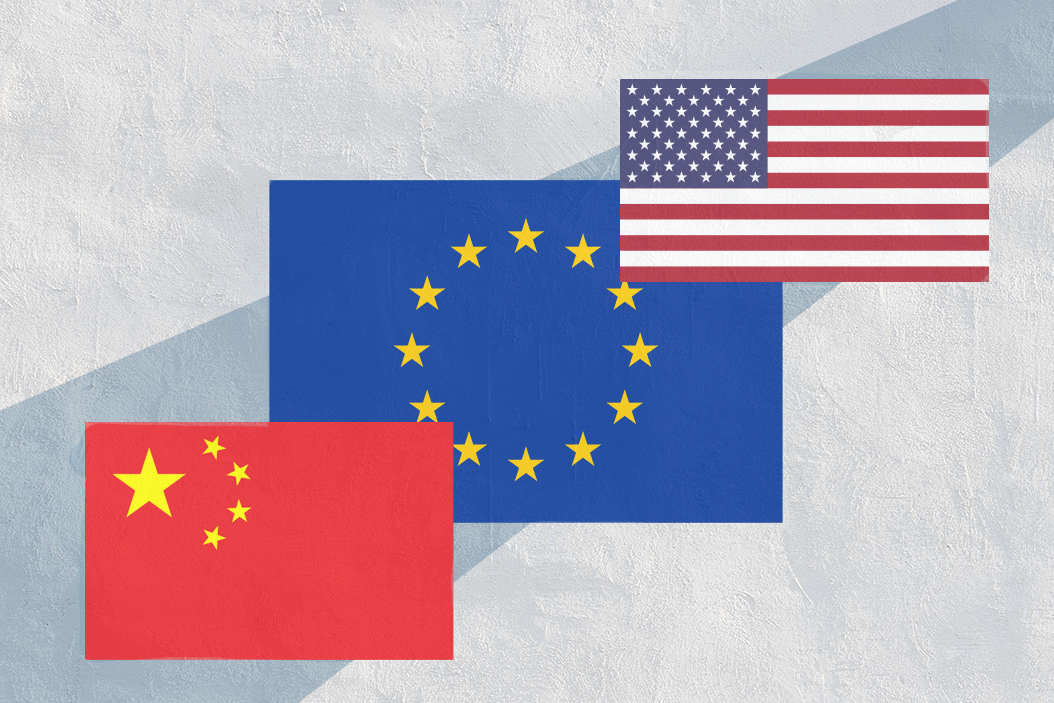How can European Union leaders boost the long-term security and prosperity of EU members while advancing a European vision for the future in an era of intensifying rivalry between the US and China? That's a subject of hot debate inside the EU these days.
Should Europe…
- Double down on strengthening traditional transatlantic relations in hopes of containing China's growing power to set new trade and technology rules, and to buttress support for "Western values" of human rights and individual liberty?
- Engage both newly dysfunctional Washington and ever-more-assertive Beijing?
- Strengthen Europe's strategic independence from the US and China?
For the moment, the answer looks to be "all of the above."
The EU is clearly hoping that President Biden will boost US-EU relations. As part of his "America First" approach to foreign policy, and warning that US allies take American taxpayers for suckers, former president Donald Trump proved willing to question the value of NATO and to slap tariffs on European steel and aluminum.It's no surprise then that after Biden's November victory, the European Commission quickly issued a report titled "A new EU-US agenda for global change," which called for greater transatlantic cooperation on trade, digital regulation and data privacy, strengthening NATO, screening foreign (particularly Chinese) investment, and limiting China's ability to set new technology standards.
And yet… As I wrote last Friday, European allies are all too aware that Trump and his defiantly unilateralist approach to traditional US allies remain popular with enough Americans that Europe could face a less friendly face in Washington again very soon. There is also recognition in Europe that China remains strong and resilient — and will continue to offer important commercial opportunities for European companies.
That's why the EU was also quick to sign a major investment deal with China, once Biden's victory persuaded China to offer important last-minute concessions. Beijing wants to avoid a united US-EU break on the expansion of its global influence on trade and tech. While the Biden team hoped Europe would hold off on the agreement, EU officials saw it differently and were willing to set aside deep concerns about China's recent push to limit democracy in Hong Kong and its use of Uighur Muslim slave labor in the Chinese region of Xinjiang. Germany's Angela Merkel has publicly rejected calls to contain China in favor of pragmatic engagement.
But change is coming to Europe. Merkel will soon exit the stage, and France's Emmanuel Macron will become, at least temporarily, Europe's most prominent voice. And Macron, like many French presidents extending back to Charles de Gaulle, is a forceful champion of European strategic independence. His vision of European "collective security" would give the EU a robust defense capability outside NATO, easing dependence on the US for European security. Macron's recent high-profile debate on the subject with German Defense Minister Annegret Kramp-Karrenbauer underlines his ambition. There are also those who want to strengthen the euro for greater use as an international reserve currency to relieve deep dependence on the dollar.
For now, realism will prevail. Despite decades of differences on important question, the EU has no more powerful military and trade ally than the United States. NATO boosts Europe's security at low cost to European taxpayers. Yet, the commercial opportunities offered by China and Beijing's growing global influence will only expand. Macron will soon be far too distracted by next year's French elections to change skeptical minds on strategic autonomy.
For now, debates within the EU will continue the all-of-the-above approach, but Europe's dilemma isn't going away.- Europe's "clear vision" for relations with China is one-sided - GZERO Media ›
- Europe's "clear vision" for relations with China is one-sided - GZERO Media ›
- Germany's floods make climate, competence top issues for election - GZERO Media ›
- Wolfgang Ischinger: Ukraine made German foreign policy go "out the window" - GZERO Media ›
- European allies welcome back a US that is engaged and “loves Europe”: Ivo Daalder - GZERO Media ›
More For You
In this Quick Take, Ian Bremmer weighs in on the politicization of the Olympics after comments by Team USA freestyle skier Hunter Hess sparked backlash about patriotism and national representation.
Most Popular
100 million: The number of people expected to watch the Super Bowl halftime performance with Bad Bunny, the Puerto Rican superstar and newly minted Album of the Year winner at the Grammys.
Brazilian skiers, American ICE agents, Israeli bobsledders – this is just a smattering of the fascinating characters that will be present at this year’s Winter Olympics. Yet the focus will be a different country, one that isn’t formally competing: Russia.
What We’re Watching: Big week for elections, US and China make trade deals, Suicide bombing in Pakistan
Japanese Prime Minister Sanae Takaichi, president of the Liberal Democratic Party (LDP), appeals for a candidate during a street speech of the House of Representatives Election Campaign in Shintomi Town, Miyazaki Prefecture on February 6, 2026. The Lower House election will feature voting and counting on February 8th.
Japanese voters head to the polls on Sunday in a snap election for the national legislature’s lower house, called just three months into Prime Minister Sanae Takaichi’s tenure.
